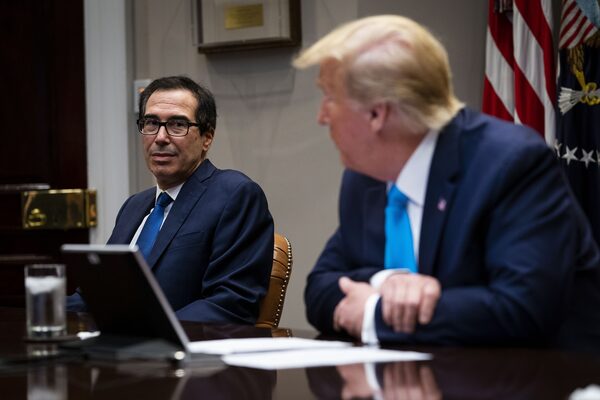
U.S. President Donald Trump and U.S. Treasury Secretary Steven Mnuchin (left) participate in a video conference with representatives of large banks and credit card companies about more financial assistance for small businesses in the Roosevelt Room at the White House, on April 7, 2020.Doug Mills/Getty Images
The U.S. government’s lending program for small businesses is tapped out, and business owners who still need loans are waiting on Congress to approve more funding.
The Small Business Administration said Thursday that it reached the US$349-billion lending limit for the program, after approving nearly 1.7 million loans.
Thousands of small business owners whose loans have not yet been processed must now look to Congress to approve a Trump administration request for another US$250-billion for the program. Lawmakers have been haggling over whether to extend the program as it stands now, or whether to add provisions that, among other things, would help minority businesses. It’s unclear when they might reach an agreement that would allow loan approvals to continue.
Business owners left in limbo were getting more anxious after hearing the program was on hold.
“Ugh. I’m starting to stress a bit,” said Greg Corey, who applied when the program launched on April 3. He last heard from his bank on Saturday. Mr. Corey, owner of Porchlight, an Atlanta-based advertising and marketing firm, has been cutting expenses and work for freelancers so he can keep paying his staff of 10.
Meanwhile, thousands of other businesses are still applying, hoping to get loans when the program is extended.
While they wait, some banks continue to accept and process applications that will be forwarded to the SBA. Others were putting their application processes on hold. Truist Bank’s website told visitors, ”we’re suspending the application process to focus our efforts on funding the first wave of SBA-approved applications.”
The fight in Congress over the extension is along party lines. Republicans are amping up the political pressure in hopes of getting a relatively narrowly drawn infusion of US$250-billion in funding into the program, but top Democrats are seeking to add funding for hospitals and state and local governments.
Action on Capitol Hill is complicated by the shuttering of the Capitol other than for pro forma sessions that require unanimous agreement in order for any legislation to advance. The sums are unlike anything that has passed under conditions requiring such unanimous consent – a wholly unprecedented situation that has scrambled the power dynamics inside the Capitol.
Democrats such as House Speaker Nancy Pelosi of California are also seeking to add provisions that, among other things, would help minority businesses.
With the stalemate, the business payroll subsidy program likely won’t get funding until next week at the earliest.
Although the halt to the program is expected to be temporary, it is another frustration for owners whose loan money has been delayed by a series of obstacles.
The number of approved loans is more than 30 times what the SBA processes in a year. The crush of applications caused technological problems at the SBA and a backlog at banks. However, many owners also faced bank requirements that excluded even long-time customers and many of those who could apply received little or no information about the status of their applications.
“I am annoyed at how poorly executed this process has been,” said Ashley Hunter, managing director of HM Risk Group, an insurance underwriter based in Austin, Tex. She said her bank has not contacted her about her application.
The loans, based on a company’s payroll costs, offer owners forgiveness if they retain workers or rehire those who have been laid off. While they wait, owners who are shut down or who have lost revenue are uneasy about the impact the virus outbreak will have on their companies.
“Without knowing how long this downturn will last, the loan would have helped us ease the burden for the long term,” said Jordan Gurrieri, co-founder of Blue Label Labs, an app developer based in New York. His company applied to a large bank on April 6; he plans to apply to a smaller one when the program reopens.
Your time is valuable. Have the Top Business Headlines newsletter conveniently delivered to your inbox in the morning or evening. Sign up today.